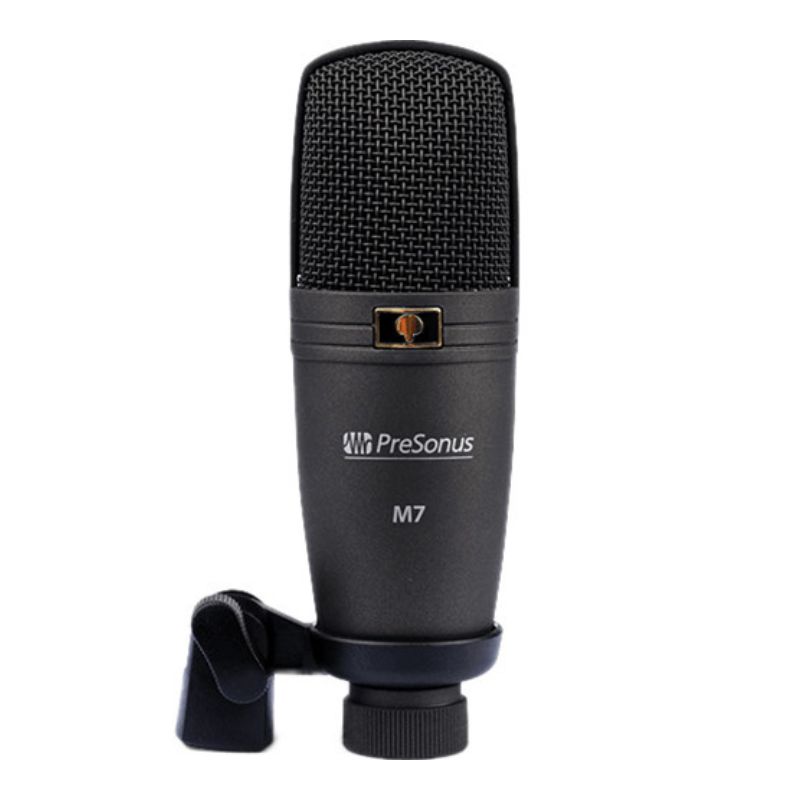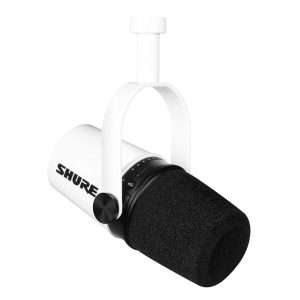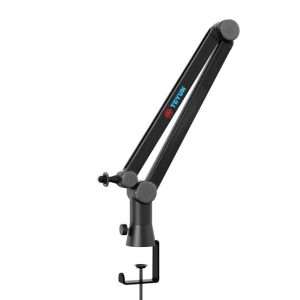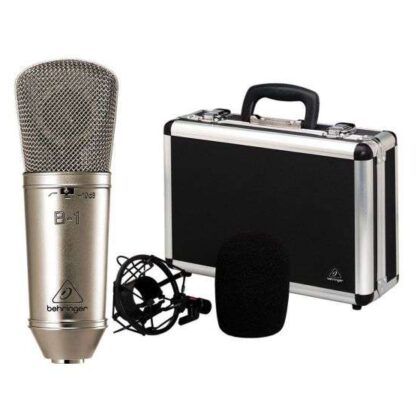Microphone
PreSonus M7 Condenser Microphone
- Versatile entry-level solution for recording vocals, guitar, and podcasts on a budget
- Back electret condenser microphone
- Cardioid polar pattern
- 134 dB of SPL handling allows for use with loud sound sources
- Hard stand mount, 10’ XLR cable, and carry case included
₨ 29,000
The PreSonus M7 is an accessible and popular cardioid condenser microphone, often bundled with PreSonus audio interfaces (like the AudioBox series) but also available as a standalone purchase. It’s designed to be a versatile, entry-level option for home recording, podcasts, streaming, and general-purpose studio tasks, offering good performance for its price point.
Features and Specs:
- Microphone Type: Electret Condenser (often referred to as a large-diaphragm condenser, though it’s technically a back-electret design). This means it requires +48V phantom power from your audio interface or mixer to operate. Condenser microphones are known for their sensitivity, wide frequency response, and ability to capture detail.
- Diaphragm: While often marketed as “large-diaphragm,” some technical teardowns suggest the actual capsule size might be smaller than a typical 1-inch large-diaphragm. However, its design aims for a sound profile associated with larger capsules.
- Polar Pattern: Cardioid. This fixed, unidirectional pattern focuses sound capture primarily from the front of the microphone, while significantly reducing sound from the sides and rear. This is excellent for isolating a specific sound source (like a vocalist or an instrument) and minimizing unwanted room reflections or background noise, making it suitable for home studios.
- Frequency Response: 30 Hz – 18 kHz. This range is tailored for vocal clarity and general instrument recording, providing a warm sound with smooth highs.
- Max SPL (Sound Pressure Level): 134 dB SPL (at 1% THD). This is a very respectable SPL handling for a condenser microphone in this price range. It means the M7 can comfortably record relatively loud sound sources like vocals, acoustic guitars, and even some electric guitar cabinets without distortion.
- Equivalent Noise Level (Self-Noise): 19 dB (A-weighted). This is a decent self-noise figure for an entry-level condenser. While not as low as high-end professional mics, it’s generally quiet enough for most home studio and podcasting applications, meaning it won’t introduce distracting hiss into your recordings in typical use.
- Sensitivity: -38 dB ± 3 dB (0 dB=1V/Pa at 1 kHz). Provides a good output signal level.
- Connectivity: Standard 3-pin XLR output. Requires an XLR cable to connect to an audio interface or mixer.
- Build Quality: Features a rugged all-metal construction, giving it a solid feel and good durability for its price point. It’s designed to withstand typical studio use.
- No On-Board Controls: The M7 is a straightforward microphone, emphasizing simplicity. It does not have physical switches for attenuation pads or low-cut filters on the microphone body. Any such adjustments would be made on your audio interface/preamp or in your digital audio workstation (DAW).
- Included Accessories: Typically comes with a hard stand mount (mic clip), a 10-foot (3m) XLR cable, and a zippered carrying case. These are valuable additions for a beginner, as they provide everything needed to get started right out of the box (apart from the audio interface itself).
Performance & Sound Quality:
- Warm Sound with Smooth Highs: The M7 is generally described as having a warm, full sound with clear, smooth highs. It’s often praised for flattering the human voice.
- Versatile for Beginners: It’s a good all-around microphone for:
- Vocals: For lead and backing vocals, offering clarity and presence.
- Podcasts & Streaming: Its cardioid pattern effectively reduces ambient sound and background noise, making it suitable for spoken word in untreated rooms.
- Acoustic Guitars: Can capture the warmth and detail of acoustic instruments.
- Guitar Amps: Its SPL handling allows it to be used on electric guitar cabinets.
- “Budget-Friendly” Performance: While it won’t compete directly with much more expensive, high-end condensers in terms of nuance or self-noise, it provides a very usable and professional-sounding recording for its price. It often performs better than many budget USB microphones.
- Proximity Effect: Like most cardioid microphones, it exhibits a proximity effect (increased bass response when close to the sound source), which can be used creatively or managed with distance.
Audience:
- Beginner Home Studio Owners: Especially those buying an audio interface bundle that includes the M7.
- New Podcasters and Streamers: Who are stepping up from built-in computer mics or very basic USB mics.
- Musicians on a Tight Budget: Looking for a versatile condenser mic for vocals and acoustic instruments.
- Students: Who need an affordable and reliable microphone for recording projects.
Based on 0 reviews
Be the first to review “PreSonus M7 Condenser Microphone”
You must be logged in to post a review.





There are no reviews yet.